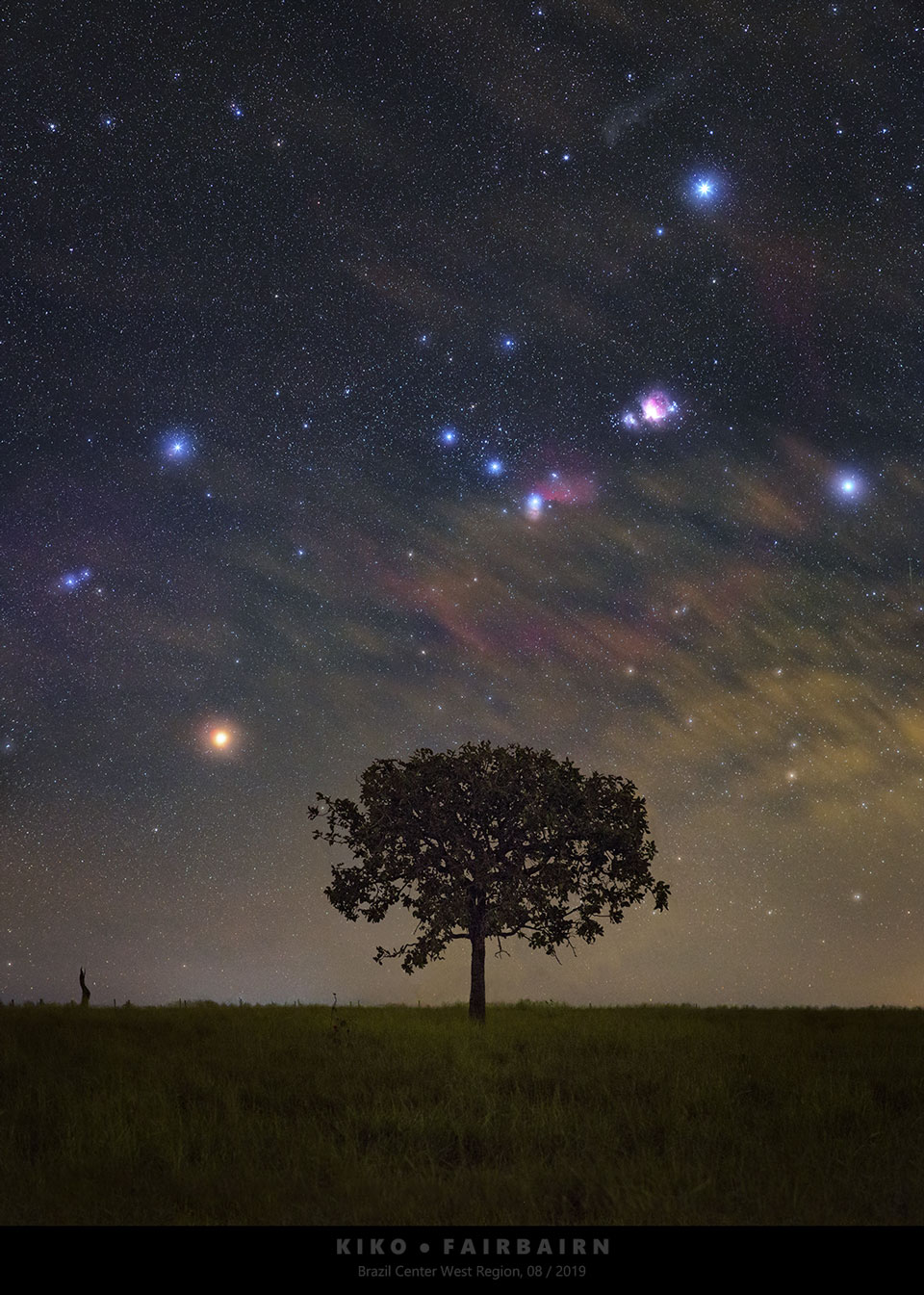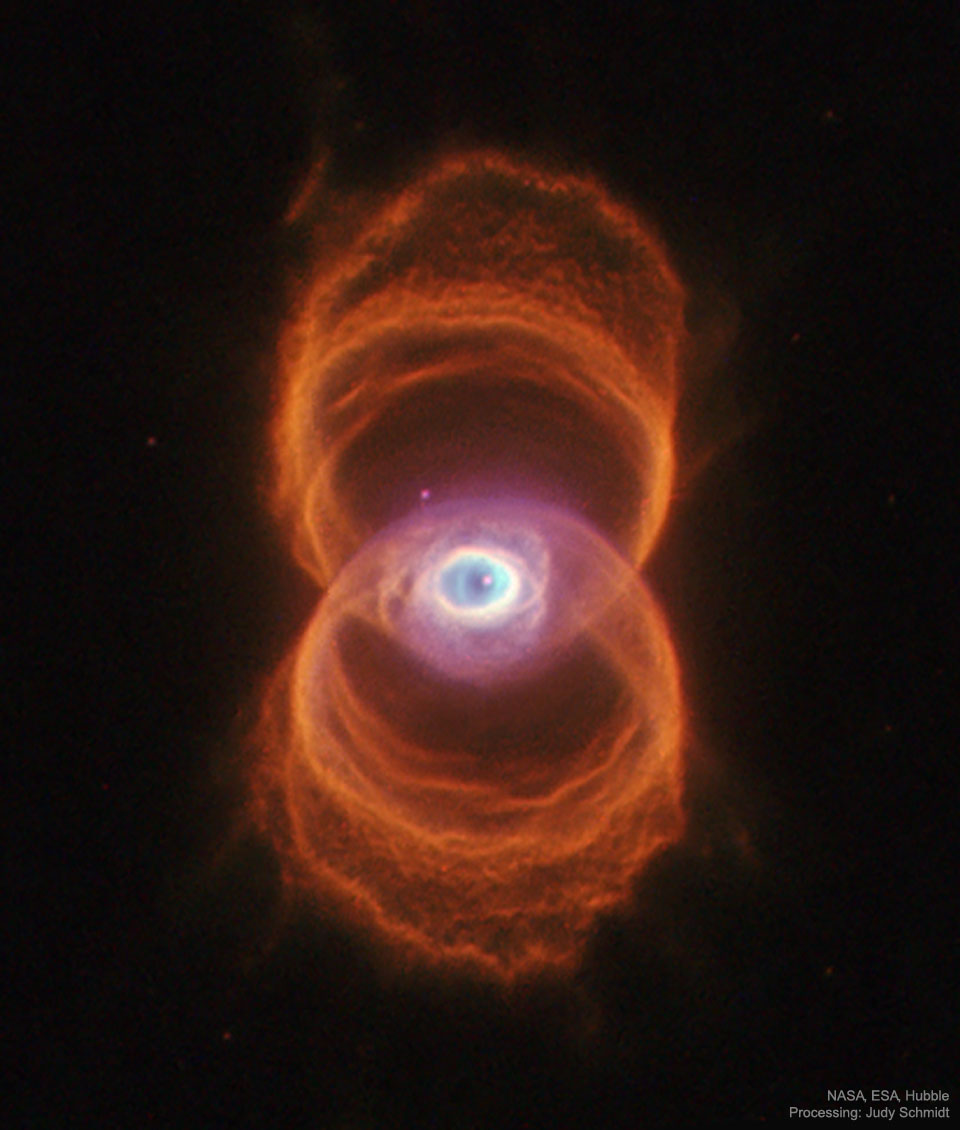| ||||||||||||||||||||||||||||||||||||||
Monday, September 30, 2019
No Need To Cut Back On Red Meat? Controversial New 'Guidelines' Lead To Outrage
APOD - Orion Rising over Brazil
Astronomy Picture of the Day
Discover the cosmos! Each day a different image or photograph of our fascinating universe is featured, along with a brief explanation written by a professional astronomer.
Image Credit & Copyright: Carlos Fairbairn
Explanation: Have you seen Orion lately? The next few months will be the best for seeing this familiar constellation as it rises continually earlier in the night. However, Orion's stars and nebulas won't look quite as colorful to the eye as they do in this fantastic camera image. In the featured image, Orion was captured by camera showing its full colors last month over a Brazilian copal tree from Brazil's Central-West Region. Here the cool red giant Betelgeuse takes on a strong orange hue as the brightest star on the far left. Otherwise, Orion's hot blue stars are numerous, with supergiant Rigel balancing Betelgeuse at the upper right, Bellatrix at the upper left, and Saiph at the lower right. Lined up in Orion's belt (bottom to top) are Alnitak, Alnilam, and Mintaka all about 1,500 light-years away, born of the constellation's well studied interstellar clouds. And if a "star" toward the upper right Orion's sword looks reddish and fuzzy to you, it should. It's the stellar nursery known as the Great Nebula of Orion.
Authors & editors: Robert Nemiroff (MTU) & Jerry Bonnell (UMCP)
NASA Official: Phillip Newman Specific rights apply.
NASA Web Privacy Policy and Important Notices
A service of: ASD at NASA / GSFC
& Michigan Tech. U.
This is an automated email. If you notice any problems, just send me a note at gtracy@gmail.com. You can add and remove email addresses to this distribution list here, https://apodemail.org.Unsubscribe
Morning Edition, now on Alexa
| ||||||||||
Sunday, September 29, 2019
APOD - MyCn 18: The Engraved Hourglass Planetary Nebula
Astronomy Picture of the Day
Discover the cosmos! Each day a different image or photograph of our fascinating universe is featured, along with a brief explanation written by a professional astronomer.
Image Credit: NASA, ESA, Hubble; Processing & License: Judy Schmidt
Explanation: Do you see the hourglass shape -- or does it see you? If you can picture it, the rings of MyCn 18 trace the outline of an hourglass -- although one with an unusual eye in its center. Either way, the sands of time are running out for the central star of this hourglass-shaped planetary nebula. With its nuclear fuel exhausted, this brief, spectacular, closing phase of a Sun-like star's life occurs as its outer layers are ejected - its core becoming a cooling, fading white dwarf. In 1995, astronomers used the Hubble Space Telescope (HST) to make a series of images of planetary nebulae, including the one featured here. Pictured, delicate rings of colorful glowing gas (nitrogen-red, hydrogen-green, and oxygen-blue) outline the tenuous walls of the hourglass. The unprecedented sharpness of the Hubble images has revealed surprising details of the nebula ejection process that are helping to resolve the outstanding mysteries of the complex shapes and symmetries of planetary nebulas like MyCn 18.
Authors & editors: Robert Nemiroff (MTU) & Jerry Bonnell (UMCP)
NASA Official: Phillip Newman Specific rights apply.
NASA Web Privacy Policy and Important Notices
A service of: ASD at NASA / GSFC
& Michigan Tech. U.
This is an automated email. If you notice any problems, just send me a note at gtracy@gmail.com. You can add and remove email addresses to this distribution list here, https://apodemail.org.Unsubscribe
Exercise for chronic pain relief
| |||||||||||||||||||||||||||||||||||||||||||||||||||||||||||||||||||
Dangerously Hot Oceans; Credit Card Gaming; Barbie Makeover
| |||||||||||||||||||||||||||||||||||||||||||||||||||||||||||||||||||||||||||||||||||
Saturday, September 28, 2019
APOD - An Analemma of the Sun
Astronomy Picture of the Day
Discover the cosmos! Each day a different image or photograph of our fascinating universe is featured, along with a brief explanation written by a professional astronomer.
Image Credit & Copyright: Gyorgy Soponyai
Explanation: This week the equinox found the Sun near the middle, but not at the crossing point, of an analemma in its annual trek through planet Earth's skies. In this scenic view, that graceful, figure-8-shaped curve was intentionally posed above the iconic Danube River and the capital city of Hungary. Looking south from Budapest's Margaret Bridge it combines digital frames taken at exactly the same time of day (11:44 CET) on dates between 2018 September 24 and 2019 September 15. That puts the metropolitan Pest on the left, regal Buda on the right, and the positions of the Sun on the solstice dates at the top and bottom of the analemma curve. December's near solstice Sun is just hidden behind a dramatic cloud bank.
Authors & editors: Robert Nemiroff (MTU) & Jerry Bonnell (UMCP)
NASA Official: Phillip Newman Specific rights apply.
NASA Web Privacy Policy and Important Notices
A service of: ASD at NASA / GSFC
& Michigan Tech. U.
This is an automated email. If you notice any problems, just send me a note at gtracy@gmail.com. You can add and remove email addresses to this distribution list here, https://apodemail.org.Unsubscribe
Inside NPR Music’s Reporting On Plácido Domingo And The Metropolitan Opera
| ||||||||||||||||||||||||||||||||||||||||||||||||||||||||||||||||||||||||||||||













